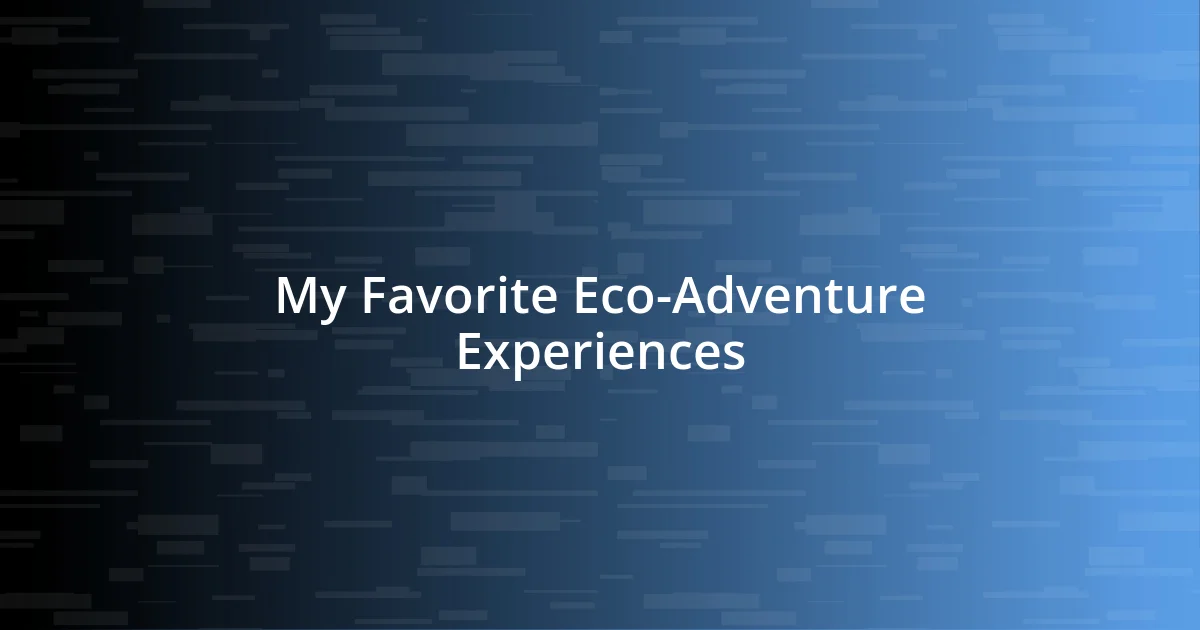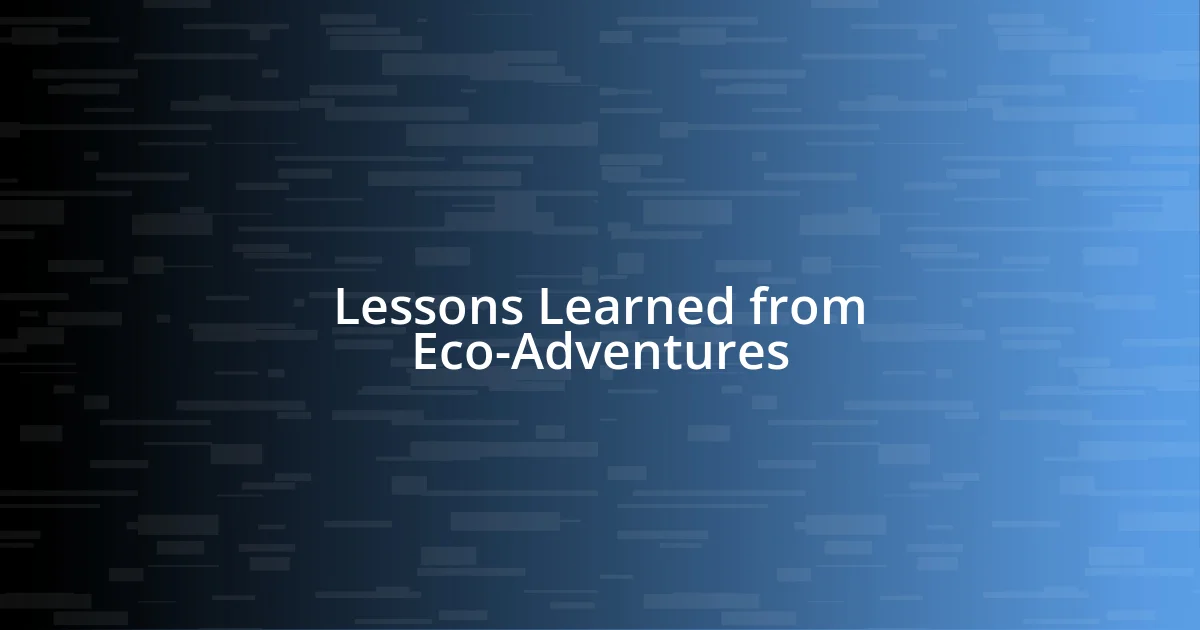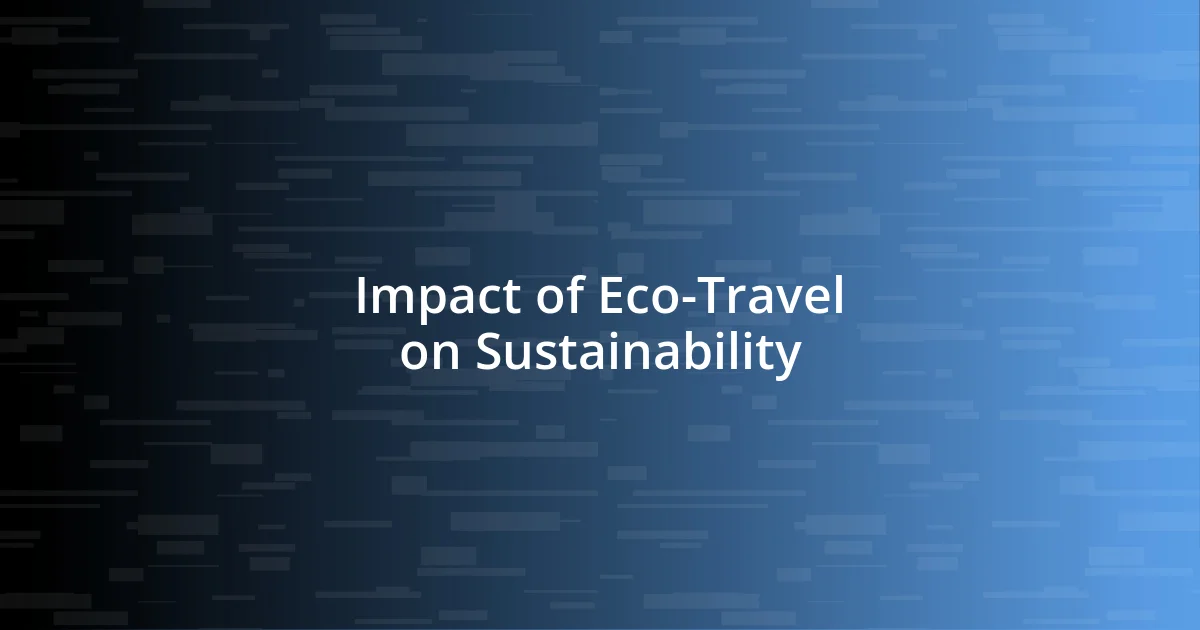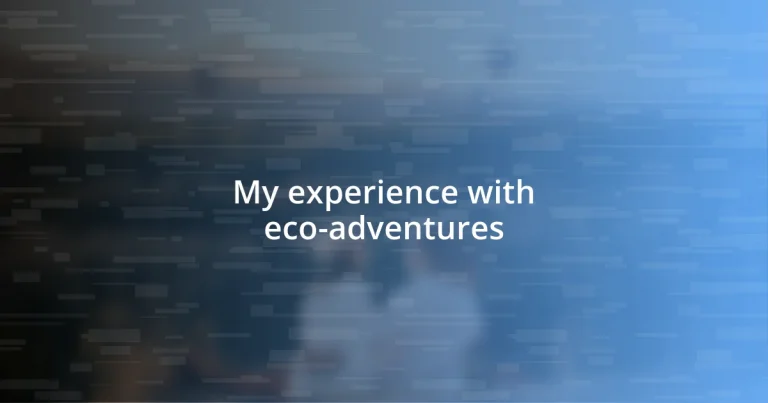Key takeaways:
- Eco-adventures promote a deep connection to nature and encourage sustainable practices while exploring diverse environments.
- Choosing the right eco-adventure involves considering personal interests, conservation impact, physical requirements, and local guidance.
- Engaging with nature responsibly and supporting local communities enhances the eco-adventure experience, leaving a positive legacy for future generations.

Introduction to Eco-Adventures
Eco-adventures are more than just thrilling activities in nature; they represent a deep connection to our environment and a commitment to sustainability. I remember my first eco-adventure—kayaking through mangroves, where the sounds of chirping birds and rustling leaves enveloped me. It felt like I was part of something bigger, a fleeting moment in the grand design of nature.
Have you ever felt the rush of being immersed in a breathtaking landscape, all while knowing you’re supporting the planet? Engaging in eco-adventures often means embracing experiences that are thoughtful and responsible. One of my most memorable trips involved hiking along a trail that prioritizes conservation. Every step not only showcased stunning vistas but also reminded me of the importance of protecting these beautiful ecosystems.
In essence, eco-adventures invite us to explore the extraordinary while fostering a sense of responsibility towards our planet. This is not just an escape; it’s an opportunity to learn, reflect, and discover our role in the natural world. When I reflect on those experiences, I realize they have reshaped my perspective on travel and adventure, guiding me toward more respectful practices.

Choosing the Right Eco-Adventure
Choosing the right eco-adventure can be both exciting and a bit overwhelming, given the multitude of options available. I distinctly recall when deciding on my first eco-friendly trip, I was torn between a wildlife safari and a mountain trekking experience. Ultimately, I chose the trek because my heart yearned for a challenge, and I wanted to immerse myself in the serenity of the highlands. This choice deepened my appreciation for the mountains and ignited my passion for responsible travel.
When selecting an eco-adventure, consider these key aspects:
- Interest and Passion: What kind of environment do you thrive in? Mountains, forests, or ocean?
- Conservation Impact: Look for activities that give back to local ecosystems or communities.
- Physical Requirements: Be honest about your fitness level to ensure a fulfilling experience.
- Local Guidance: Engage with knowledgeable local guides who prioritize sustainable practices.
- Duration and Accessibility: Choose adventures that fit your schedule and are conveniently located.
By reflecting on these elements, you can make a choice that resonates with both your adventurous spirit and your desire to contribute positively to the planet.

Preparing for Eco-Friendly Travel
Preparing for eco-friendly travel involves a blend of thoughtful planning and an eagerness to embrace nature. I find that taking the time to research the destination can significantly enhance the experience. For instance, on my journey to a coastal location, I discovered local eco-lodges that practiced sustainable tourism, blending comfort with environmental care. This not only resulted in a cozy stay but also a beautiful exchange with nature, feeling like an integral part of the community.
Packing light is another crucial aspect. I’ve learned the hard way that dragging too much luggage around can become burdensome and counterproductive to the whole eco-friendly ethos. I like to limit myself to essentials—think reusable water bottles, biodegradable toiletries, and eco-friendly clothing that can withstand a few washes while keeping its quality. Plus, it’s incredible how liberating it becomes when you’re not weighed down by excess baggage!
Lastly, I believe in being mindful of my transportation choices. I usually opt for public transport or bike rentals, which not only reduce my carbon footprint but allow me to connect with the local scene in a more intimate way. There’s nothing quite like the joy of cycling through a quaint village, taking in the sights and sounds, while knowing I’m contributing to a sustainable adventure.
| Aspect | Eco-Friendly Option |
|---|---|
| Accommodation | Eco-lodges or sustainable hotels |
| Packing | Light packing with reusable and biodegradable items |
| Transportation | Public transport or bicycle rentals |

Engaging with Nature Responsibly
Engaging with nature responsibly goes beyond just enjoying the beauty around us; it’s about fostering a respectful relationship with the environment. I vividly remember hiking through a national park where I stumbled upon a picturesque waterfall. Instead of plunging in and disturbing the area, I paused to soak in the moment while ensuring I stayed on the trails. This experience taught me the importance of preserving these natural wonders for future adventurers. How often do we forget that our actions today can impact tomorrow’s explorers?
I also believe that practicing Leave No Trace principles is crucial for anyone who wants to engage with nature responsibly. During one of my camping trips, I witnessed the aftermath of careless travelers who left trash behind. It was disheartening. Since then, I’ve made it a personal mission to pack out everything I bring in, and I often encourage others to do the same. Have you ever realized that simple actions, like picking up litter, can be a powerful statement about our commitment to preserving nature?
Lastly, it’s vital to connect with local communities and understand their relationship with the land. On my last eco-adventure, I participated in a beach cleanup event organized by a local group. Not only did I contribute to the health of the coastal environment, but I also learned about the delicate ecosystems that needed protection. Engaging with locals can enhance our appreciation of their culture and history. Isn’t it fascinating to think that by learning from others, we can broaden our own perspectives on nature and conservation?

My Favorite Eco-Adventure Experiences
One of my most cherished eco-adventure experiences took place while kayaking in a serene mangrove forest. As I paddled slowly, I was struck by the vibrant life teeming beneath the surface—fish darting to and fro, herons wading gracefully, and the magnificent roots of mangroves arching like sculptures in the water. It was a magical feeling, knowing that my quiet presence allowed me to observe this ecosystem without disturbance. Have you ever felt that kind of harmony with nature?
Another unforgettable moment occurred during a volunteering trip to plant trees in a community reforestation project. Getting my hands dirty and actually connecting with the earth filled me with a sense of purpose. I remember an elderly local man sharing stories about the land and how important these trees were for future generations. It made me realize that eco-adventures aren’t just about personal enjoyment; they’re also about leaving a positive impact on the places we visit. How often do we consider the legacy we’re creating through our travels?
Lastly, my journey to a wildlife sanctuary was nothing short of transformative. Witnessing animals in their natural habitat and learning about their conservation efforts was eye-opening. Participating in educational programs really immersed me in the realities of wildlife protection. I walked away with a profound respect for those tirelessly working to safeguard these creatures. Don’t you think such experiences remind us why we should prioritize protecting our planet? It’s a reciprocal relationship where we give a little back to embrace more of the beauty around us.

Lessons Learned from Eco-Adventures
Engaging in eco-adventures has taught me that nature doesn’t just offer beauty; it reveals valuable life lessons. I remember hiking up a challenging trail, feeling exhausted and ready to give up halfway through. But I pushed on, and when I reached the summit, the breathtaking view made every step worthwhile. Isn’t it funny how perseverance in nature often mirrors our everyday challenges?
One standout lesson was the importance of adaptability. During a camping trip, an unexpected storm forced us to re-evaluate our plans. Instead of feeling defeated, we took the opportunity to explore nearby caves, discovering an intriguing side of the wilderness. I realized that sometimes, the best experiences emerge from the unplanned moments. Have you ever found joy in a detour?
Participating in eco-adventures has also underscored the need for gratitude. After volunteering at a local conservation site, I felt an overwhelming sense of appreciation for the natural wonders that often go unnoticed. One warm afternoon, as I dug into the soil, I reflected on how small efforts can lead to significant change. It dawned on me just how interconnected we all are with the environment. It makes me wonder, how much do we take for granted in our fast-paced lives?

Impact of Eco-Travel on Sustainability
Engaging in eco-travel truly opens my eyes to sustainability’s tangible effects. When I visited a sustainable farm, I had the chance to work alongside the farmers using organic methods, and I felt a deep connection to the land. It was awe-inspiring to see how intentional practices not only produce food but also nurture the ecosystem. Have you ever witnessed how your actions can positively influence the environment?
Another experience that stands out was during a beach cleanup. As I collected pieces of plastic, I was struck by how even small actions can lead to a ripple effect of change. Each piece I picked up felt like a step towards healing the ocean. I remember a local activist sharing how this collective effort inspires community awareness about waste management. It made me ponder: how can our adventures lead to greater environmental responsibility?
On a hike through a protected wilderness area, I understood how eco-travel supports conservation. The trail maintenance crew I met shared stories about preserving habitats while still allowing people to explore them responsibly. It hit me that eco-adventures like this create jobs and sustain local economies, promoting a cycle where both nature and communities thrive. Have you thought about how your travel choices can contribute to a sustainable future?














